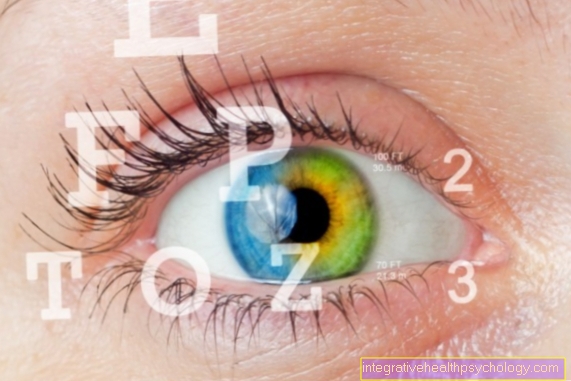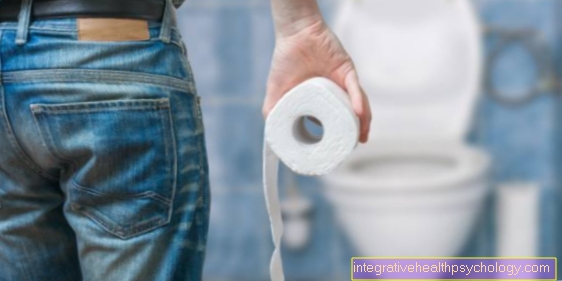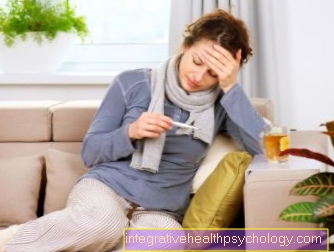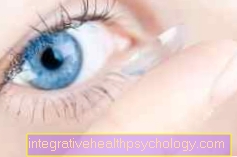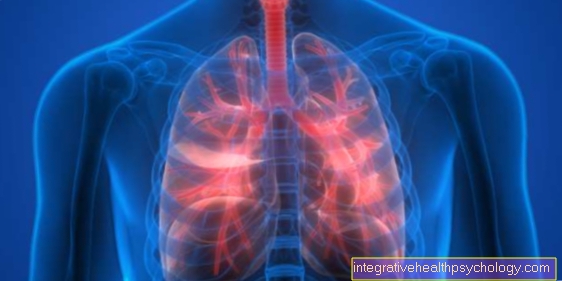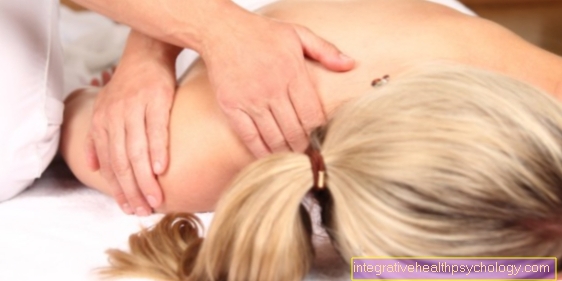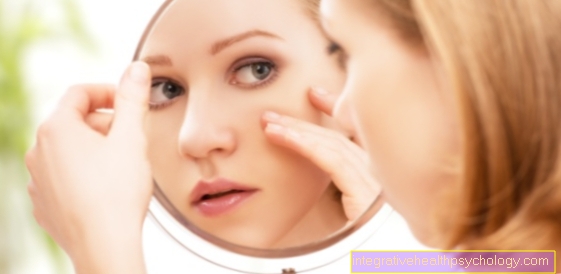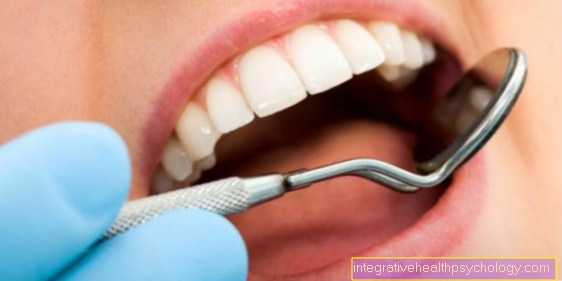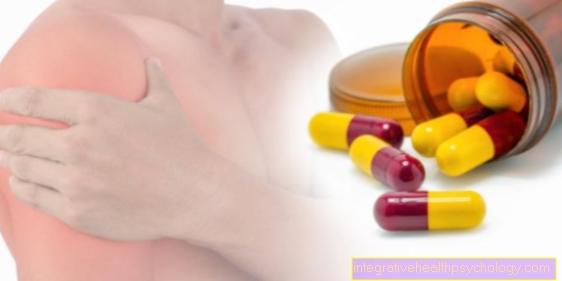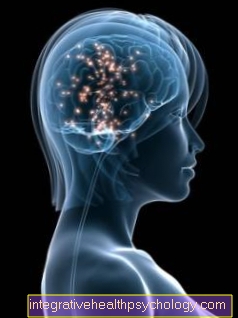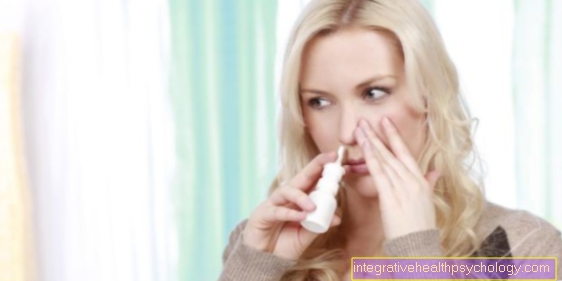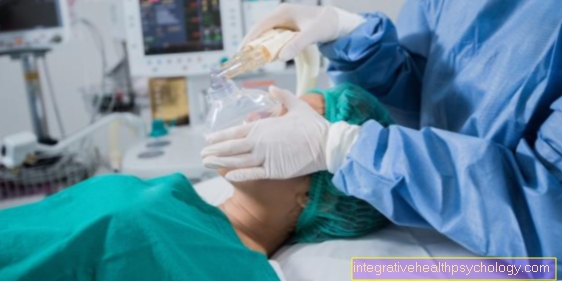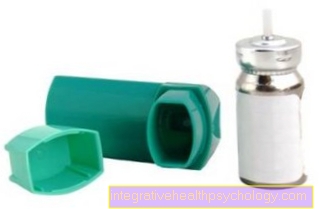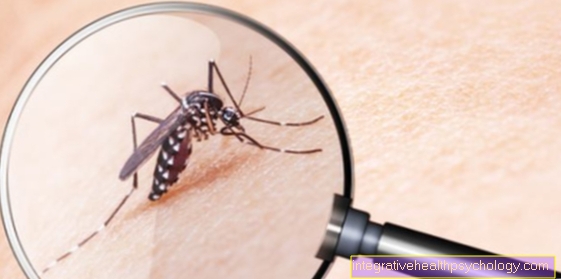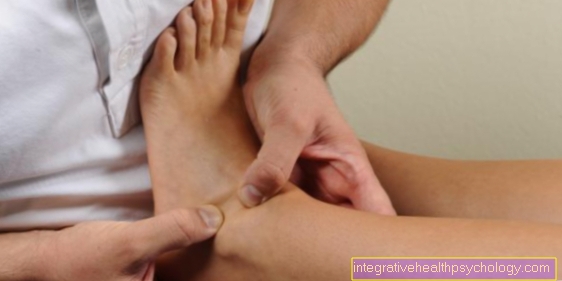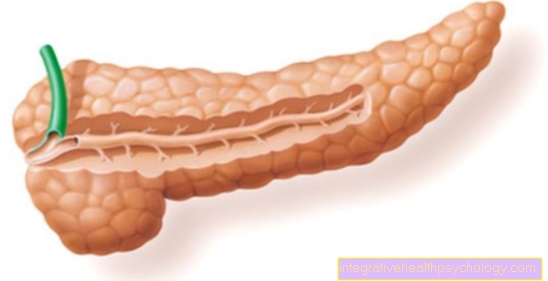Postpartum depression
Synonyms
Baby blues, postpartum depression (PPD), puerpal depression
definition
In most cases the terms “postpartum depression”, baby blues and postpartum depression are used equally. Strictly speaking, however, the “baby blues” only refers to an emotional, slightly depressive instability of the mother (one also speaks of the so-called crying days) in the first two weeks after delivery, which lasts only for a short time. This has no disease value and does not need to be treated. On the other hand, there is postpartum depression, postpartum depression or even postpartum psychosis, which are significantly more severe, long-lasting and require treatment. This can occur several months (up to a year) after the delivery.

introduction
For many women, the great anticipation of the offspring, which exists during the nine months of pregnancy, turns into a low mood after giving birth. Instead of pride, happiness and great affection, affected women often experience deep fear of failure and excessive demands. In most cases, the mood of the “freshly baked” mothers will improve in one to two weeks without therapy. However, should the underlying depression persist for a longer period of time, therapy in the form of psychological discussions through to drug treatment is necessary.
Typical signs of postpartum depression
In most cases, postpartum depression begins within 2 weeks of the birth.
By definition, however, the occurrence of depressive symptoms up to 2 years after delivery is considered postpartum depression.
Signs of postpartum depression can be depressed mood, lack of joyfulness, or increased irritability.
Ambivalent feelings towards the child can also arise.
In addition, postpartum depression can lead to symptoms such as concentration disorders, sleep disorders, lack of energy and reduced drive, headaches and dizziness, hopelessness and increased anxiety up to panic attacks.
Which symptoms appear as the first signs varies greatly from woman to woman.
At the beginning, for example, increased irritability or the feeling of not feeling emotionally much can be used as indicators.
The possible occurrence of suicidal ideation in the context of postpartum depression should not be underestimated.
This can also lead to the woman concerned thinking about killing herself and the child (extended suicide). Therefore, if thoughts of suicide arise, a doctor should always be consulted very promptly, and relatives should also be informed so that they can offer security and ensure that they are presented to the doctor.
root cause
The exact cause of postpartum depression has not yet been clarified. It is believed, however, that the rapid change in hormones after the child is born has a major impact on the mother's mood. With the afterbirth of the placenta (Plaster cake) the concentrations of the female sex hormones estrogen and progesterone decrease, which during pregnancy had a rather mood-stabilizing effect via receptors in the brain. The sudden drop in both hormones and the increase in the hormone prolactin (prolactin is responsible for the production of milk in the mammary gland) are probably the trigger for the mood swings, sadness and hopelessness that are often described in postpartum depression. However, this is only a guess and by no means a proven cause.
Furthermore, it is also assumed that there is a strong connection between postpartum depression and an oxytocin deficiency. Oxytocin has become known as the "cuddle hormone" and is of great importance for inducing labor, breastfeeding and the bond between mother and child.
Furthermore, some Risk factors described, which can also have an influence on the development of postpartum depression. A pregnant woman who was pregnant during or even before mental illness as part of a depression, an obsessive-compulsive disorder, an anxiety disorder, a Panic disorder or one phobia has a significantly increased risk of postpartum depression. Do mental illnesses occur in the family heaped up, this also leads to an increase in risk. Another possible cause of postpartum depression is that physical and mental exhaustion the mother, which by an increasing lack of sleep can be caused. If the newborn is awake particularly often and for longer periods of time and needs the mother's attention, this can lead to less sleep time and to restless, unrefreshing sleep. But that one greatest risk factor for postpartum depression is an existing one Life crisis. Mothers who are under social (little support from family, friends, or partner) or financial poverty suffer from a significantly higher risk of depression after delivery.
diagnosis
Of particular importance is the early detection postpartum depression, because this is the only way to treat it in good time without the woman continuing to feel depressed. In order to diagnose postpartum depression, first organic diseases, such as. a thyroid disease or anemia (insufficient blood formation, e.g. due to an existing iron deficiency) can be excluded. These two clinical pictures cause similar symptoms, but must be recognized and treated much faster. Next, it is important to identify any actual postpartum depression that needs treatment from the so-called baby blues to delimit, which are just a few “crying days” right after delivery that will improve on their own without treatment. The diagnosis of postpartum depression is ultimately based on the Edinburgh postnatal depression scale (EPDS), which is a questionnaire with 10 questions specially developed for diagnostics. The higher the resulting value (there is a certain number of points for each answer), the more severe the depression.
Is there a test that can diagnose postpartum depression?
Yes and no. The reliable diagnosis of depression is not provided by a questionnaire, but by a doctor or psychologist.
But there are special questionnaires that aim to identify postpartum depression.
As an example, she mentions a test called the Edinburgh Postnatal Depression Scale (Edinburgh Depression Questionnaire after the birth).
It consists of 10 short questions. You are asked whether certain feelings / moods / ideas have occurred in the last 7 days.
The questions asked are, for example, the basic mood, the presence of feelings of guilt, the ability to be happy, the presence of fearfulness and panic, the presence of excessive demands as well as sleep disorders and suicidal thoughts.
There are 4 predefined answer options from which one can be selected.
The answer options are the same for every question. Points are awarded for each of the answers.
The higher the score, the more likely it is that postpartum depression is present.
From 13 points or higher, the probability of depression is high.
The test is often used by doctors when there are already indications of the presence of depressive symptoms. However, the test can also be accessed by those affected or by their relatives on the Internet and answered and evaluated on their own.
If there is a suspicion of depressive symptoms (score over 10 points) or if question 10 on suicidal thoughts could not be answered with "no", a doctor should be consulted to decide on how to proceed.
Frequency distribution
The frequency distribution of postpartum depression is approx. 10-15% all Mothers and even at 4-10% of the Fathers. These can either have developed the low mood as part of the depression in their own woman or by themselves without the woman being affected. In contrast, the frequency of the Baby blues clearly increased. Round 25-50% of all mothers show a short-term depression of mood immediately after delivery, but this does not require any treatment.
Symptoms
Basically, the most common symptoms of postpartum depression are similar to those of birth-independent depression. Affected women often feel drive and energy freewhich can lead to general disinterest. The family, friends and the own child lose importance for the mother and are hardly noticed by some. Others, however, experience undue fear and concern for their newborn's welfare, which leads them to feel like one Doll look after and physically lack nothing. In this case, however, the lack of personal bond between mother and child is a problem, because affected mothers often fail to develop stable, loving feelings for their child. Constantly prevailing doubt in one's own maternal ability as well as the ConcernMaking fatal mistakes as a mother towards the child restricts any love that can develop. The Lack of a good relationship between child and mother creates a feeling of sadness and Joylessnesswhich makes it even more difficult for the mother to take a step towards the child.
How long does postpartum depression last?
Postpartum depression, like depression that is not related to pregnancy, usually lasts for several weeks, rather months.
At some point, depression is usually over without treatment.
However, due to the length of time it lasts for months, it is an extremely agonizing time for those affected without treatment. It is therefore essential to think about starting (psychotherapeutic and / or medicinal) therapy at the beginning of the illness.
Most women affected are aware that they cannot be there enough for their newborn at the moment, which is a feeling worthlessness and Feelings of guilt lets arise. In addition, some also occur physical symptoms on, e.g. Numbness, Heart trouble, Tremble such as sexual aversion, which can even cause discrepancies in the partnership. In many cases, the onset of postpartum depression is not recognized in time, because the typical initial symptoms are rather inconspicuous. Headaches, dizziness, concentration disorders and sleep disorders as well as enormous irritability can be the first signs of the onset of postpartum depression. Early diagnosis, however, is not to be neglected. She stays for a long time undetected and untreatedso it is possible that even suicidal thoughts in the sense of suicide or infanticide (infanticide).
therapy

The treatment of a depressive mood after childbirth depends on the severity of the depression. If only the so-called baby blues are present, no drug or psychotherapeutic therapy is necessary. This is a for 1-7 days existing low mood, which however by itself improves. In support of this, women with baby blues can be offered calming conversations, in which they can talk about their fears and worries and work out a strategy together Coping with everyday life is worked out. It is also advisable to hire a nanny or housekeeper to keep the burden on the mother as low as possible. However, this is particularly important Support from the partner and / or child father. Does the depression last longer than 2-3 weeks, this should be treated to avoid long-term consequences (severe postpartum depression). In particularly bad cases with an existing risk of suicide or childicide, a hospitalized be considered by mother and child. In this way the mother can get out of her everyday life and be optimally relieved. Against common symptoms like fear, inner unrest and sleep disorders, antidepressants may be prescribed. By treating difficulties falling asleep and staying asleep, these lead to more restful sleep, which gives women more energy to cope with everyday life. Furthermore, often psychotherapeutic conversations offered for mother and father. In this way, they are given the opportunity to deal with any existing family problems and thus better adjust to the new life situation with their child. Many affected women visit as well Support groupsin which they get to know others who are similar to them. The feeling of being understood is particularly great here. In small groups, tips are exchanged on how to cope better with everyday life and the easiest way to cope with stressful situations.
Homeopathy for postpartum depression
Homeopathy is not designed to effectively treat depression. This requires a trained doctor (psychiatrist) or psychologist.
Only in the case of slight depression or frequent mood swings that do not reach the severity of depression, homeopathic remedies can be used if the person concerned so wishes.
These remedies include, for example, dried seeds from Ignatian beans, metallic gold (Aurum metallicum), table salt (sodium muriaticum), lime (Causticum), pasque flower (Pulsatilla pretensis), poison oak leaves (Rhus toxicodendron), white bryony (Bryonia alba), calcium carbonicum, dried ink bag contents (Sepia officinalis), cinchona tree (China officinalis), rue / rue (Ruta graveolens) and the peanut nut (Nux vomica).
Which drugs help with weekend depression?
The same medications help with postpartum depression as with depression that occurred independently of the pregnancy. So the drug group of antidepressants is used. The limiting factor in postpartum depression is above all that numerous antidepressants partially pass into breast milk, so that breastfeeding would no longer be possible if these drugs were taken. However, there are also antidepressants that can be taken almost safely while breastfeeding.
These include, for example, some active substances from the group of serotonin reuptake inhibitors (SSRIs). Active substances from this group that can also be taken during breastfeeding are sertraline and possibly also citalopram.
In some infants, however, the mother experienced symptoms such as restlessness or drowsiness while the mother was receiving citalopram, so that the infants should be closely observed during the therapy. Drugs from the group of tricyclic antidepressants such as amitriptyline and nortriptyline can also be used during breastfeeding.
In general, however, a psychiatrist should always be consulted when deciding on therapy, as factors other than those mentioned also play a role in the selection of the right antidepressant.
Can you breastfeed with medication?
As already described in the previous paragraph, there is the problem that many antidepressants pass into breast milk and thus prohibit breastfeeding.
So there are two options: Either the mother stops breastfeeding or therapy with an antidepressant is started, under which breastfeeding of the child is proven possible.
The possible active ingredients belong, for example, to the group of SSRIs. These are currently the first choice antidepressants. But also in the drug group of tricyclic antidepressants there are active ingredients that can be taken during breastfeeding. Other drugs can also get into breast milk.
Therefore, before taking a new medication, breastfeeding mothers should ask their general practitioner whether breastfeeding is possible with this medication.
prophylaxis
The most important method of prophylaxis for postpartum depression is this early detection all mood lows after childbirth. So can take place in time conversations fears and worries lead to the mother feeling understood and supported right from the start and developing enough trust to be able to relate to stressful stressful situations get help early enough. In this way, the development of severe postpartum depression that requires treatment is prevented. Also is a stable support by the partner, by family or by friends indispensable in order to be able to get through difficult moments in the new phase of life.
forecast
The prognosis for postpartum depression is usually very good. If there is baby blues, the symptoms usually disappear completely after 1-2 weeks and without treatment. Women with slightly more severe forms of postpartum depression should do in time are treated to prevent severe long-term consequences, but in most cases also recover Completely.



